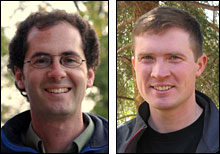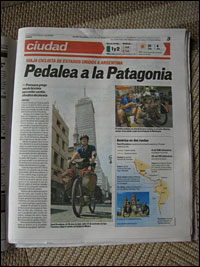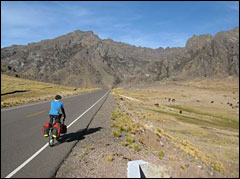
Bill Bradlee and David Kroodsma.
What work do you do? How does it relate to the environment?
David: Over the past 17 months, I bicycled from California to the southern tip of Argentina to raise awareness of the international consequences of global warming. I gave talks, visited schools, got in the media, and posted information in my blog, with the hope that Americans would look outside our borders and follow along. I was far more successful than I expected, appearing in the national media of almost every country I biked in, visiting about 60 schools, and having thousands follow me on the website.
I knew, though, that if I really wanted to make a difference about global warming, I would have to bike across the U.S. Via the internet and some referrals, I met Bill, who was interested in the same project.
What are you working on at the moment? Any major projects?

Some local press for Kroodsma.
Photos: rideforclimate.com
Bill: We have started Ride for Climate USA. It’s a bicycle tour to educate about the science and impacts of global warming and encourage action. We’ll be starting the U.S. ride on April 21 at the Old North Church in Boston, the same place where Paul Revere began his ride. We’re giving presentations at businesses, schools, congregations, and other spots all along our route. We’ll also be keeping a blog and coordinating some group rides. Here’s the route and schedule.
How do you get to work?
Bill: We quit our jobs to take on this project because we feel this issue is so important and we’re at a key moment to make change. We’ll be bicycling to each talk. No support vehicle — just two bicycles laden with 80 pounds of gear, including a laptop for our presentations.
What long and winding road led you to your current position?
Bill: When I started graduate school I got a work-study job with an amazing forest-canopy scientist who founded a nonprofit to promote education and conservation around forests. I worked with several other nonprofit organizations learning about the science and politics of global warming. Most recently I learned about reaching out to the faith community through my work as managing director of the Interfaith Power & Light project.
David: During my senior year in college, I studied abroad in Chile and was shocked by a developing economy. I’ve spent a lot of time since then thinking about how 6.5 billion people can share this planet. I returned to Stanford and got a master’s of science in Earth Systems studying global warming and the carbon cycle, issues that I see as central to this question of how we will live on this planet. Afterwards I worked in a lab for my adviser on a project that attempts to figure out the potential effects of global warming on grassland ecosystems in California.
Who is your environmental hero?

A long slog uphill for climate.
Bill: My environmental heroes are the scientists at Real Climate. Scientists often don’t interact well with the public or policy sphere. But times are changing and we live in a world where global environmental issues require all of us to better understand the science behind them so that we can make informed decisions. These guys help break through the ivory-tower barrier and explain the science of climate change to those who can’t spend all day reading scientific journals.
My other heroes are every person out there who lives a simple, joyful life. They get no recognition for it, but they are great role models for the rest of us.
David: I have to agree with Bill, and especially on Real Climate. Visiting their site always makes me feel good — they are people trying to communicate as clearly as possible what we know.
What’s your environmental vice?
Bill: Exhaling carbon dioxide, but I refuse to give it up for another 40 years or so.
David: Small portable electronics. I’m not sure exactly how it’s bad for the environment, but I feel like something about it is unsustainable.
What’s your favorite meal?
David: Anything with lots of calories — after a few hours of biking, nothing beats a liter of chocolate milk.
What’s your favorite place or ecosystem?
Bill: The lichen- and moss-festooned Western red cedar and Western hemlock forests of the Pacific Northwest. Specifically, the Elwha region of the Olympics, which used to be home — and may be again someday — of 100-pound salmon.
David: The redwood forests between San Francisco Bay and the Pacific Ocean. There are windy one-lane roads that let you bike right next to the giant trees.
If you could institute by fiat one environmental reform, what would it be?
Bill: Every product over a certain dollar amount must have a sticker like a nutritional label on food. The sticker helps show the true ecological costs of the product. It could list things such as the energy used around shipping and production, where the raw materials came from, etc.
David: Repeal all subsidies for fossil fuels.
Who was your favorite musical artist when you were 18? How about now?
Bill: When I was 18: Pink Floyd. Now: independent musicians who don’t have an advertising budget but have unbelievable talent. Groups like Session Americana and The Resophonics out of Boston, and singer-songwriter Peter Mulvey out of Milwaukee, who will be doing a music tour by bicycle this fall.
If you could have every InterActivist reader do one thing, what would it be?
Bill: Ride your bicycle! And also support your local bicycle-advocacy organization, because they help make sure bicycling is a safe and viable form of transportation.
David: Yes, there is something wrong about a place where it’s not safe to bike. What if we all supported bike lanes and bike use?

